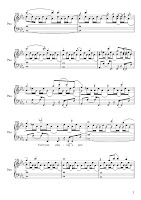







you’re just playing a part: This gem of hopelessness has been with me for about 4 years now; around the same period of time that I have been playing piano – incidentally this was one of the first songs I tried to play. Even though Thom Yorke’s live version has a hypnotic intensity of its own, I always especially liked the feel of the studio version’s hectic drum beat, the interplay of the different melodic lines and the uneasily simmering background soundscapes. So I decided to take the challenge to fit as much as possible of the studio version into a piano arrangement – this is the most comprehensive that I could.
In this song five different “sonic instances” can be heard apart from the voice. The song starts out with vocals, a characteristic, somehow “waving” shifting two-note pattern in off-beat (continuing throughout the song) and a melodic line which mirrors that of the vocals, both of these played in a piano-like timbre, the first with an echo effect. The bass guitar adds the root tones, but takes on a rather subdued role in terms of rhythm, whereas the synthesized drums account for most of the rhythmical characteristics of the song, featuring a fast-paced pattern throughout the song with only slight variations, mostly in the bass drum accentuations. Altogether this creates a thick texture of interwoven melodic elements; interpreting the song as a statement on modern-life purposelessness we can safely say that the merciless drumbeat accents underline the concepts of monotony and the elapsing time of people, stuck in a pattern of daily routine, while the intertwined texture may symbolize the complexity of modern life and the many choices we have to make among the millions of possible options. As becomes evident, the music does not serve simply as a vehicle that carries the lyrics, but expresses much of what is mentioned in the lyrics on a different and much more immediate level. During the first refrain (“It gets you down…” – 0:38), the whole texture is quasi immerged in a synthesizer chord – I like to think of it as a “sound plain”. At 1:17 into the song the piano line mirroring the vocal melody drops out, whereupon the drums rest for the only time throughout the song (1:36). Fittingly, this coincides with the line “there is no time to analyse, to think things through, to make sense” – it is as if the individual had finally stopped to think things through for a moment, and even the bass guitar gives some breathing space by skipping its usual dotted beat. However, there is no time for this, so starting with the drums the whole apparatus kicks in again after just for bars; the sound plain - while subdued at first/dropping out during the last passage – returns with renewed intensity. The bass soon gets more aggressive too (1:55) taking big leaps in a syncopated rhythm. Another “instrument” enters – high-pitched synthesized notes of a drop-like intensity that I will call “treble drops”. After another lull period (3:02) which reflects utter resignation, all instrument join in as hysteric as ever, only to fade out suddenly and disharmoniously shortly later.
My arrangement seeks to represent all the details relevant to the thematic unfolding of the song: The left hand plays the parts of the bass, but includes the accents in the drum beat. The right hand meanwhile plays the two-different piano patterns – some of the additional harmonies that the sound plains, which could not be considered further, add, are included on non-accentuated times in the left hand. As the treble drops enter, the arrangement shifts into a higher register with the bass reduced to a sustained root note at times.
There is no time to analyse, to make sense. What if there was? Would it do any good? I have had plenty of time to analyse, basically it is most of what I have been doing in my life, but I am growing ever more uncertain it has added anything valuable to my life, save avoiding some of the commonplace cognitive pitfalls. Yet I realized that it has also withered my intuition and separated my body from the mind. That is why recently I have preferred sticking to doing rather than thinking or talking and I fare rather well with it.
Keine Kommentare:
Kommentar veröffentlichen